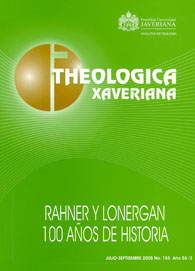Abstract
La figura de Karl Rahner constituye un modelo de apertura en la teología católica del siglo XX. El valor teológico y cristiano, así como la legitimidad que reconoció en las religiones no cristianas es uno de los mayores aportes hechos a la Iglesia en la línea del ecumenismo. La controvertida noción de cristiano anónimo, que amplía universalmente el horizonte de salvación abarcando a todos los seres humanos, expresa muy bien el espíritu incluyente del Concilio Vaticano II, en cuyos textos, no obstante, la propia calidad teológica de las religiones no cristianas ha quedado indefinida.RAHNER, KARL, “Bekenntnis zu Jesus Christus” (“Profesión de fe en Jesucristo”), en SCHULTZ, HANS JÜRGEN, (ed.) Juden Christen Deutsche, Stuttgart, 1991.
RAHNER, KARL, “Das Christentum und die nichtchristlichen Religionen”
(28.4.1961), en SzTh 5, 1962, pp. 136-158.
RAHNER, KARL, “Der eine Jesus Christus und die Universalität des Heils”, en SzTh 12, 1975, pp. 251-282.
RAHNER, KARL, “Erfahrungen eines Theologen”, en HerKorr 38, 1984, pp. 224-230.
RAHNER, KARL, “Jesus Christus in den nichtchristlichen Religionen”, en SzTh 12, 1975a, pp. 370-383. (Primera publicación en 1974 en la documentación de un simposio sobre el concepto de la revelación que tuvo lugar en la India).
RAHNER, KARL, “Über die Heilsbedeutung der nichtchristlichen Religionen”, en SzTh 13, 1978, pp. 341-350.
This journal is registered under a Creative Commons Attribution 4.0 International Public License. Thus, this work may be reproduced, distributed, and publicly shared in digital format, as long as the names of the authors and Pontificia Universidad Javeriana are acknowledged. Others are allowed to quote, adapt, transform, auto-archive, republish, and create based on this material, for any purpose (even commercial ones), provided the authorship is duly acknowledged, a link to the original work is provided, and it is specified if changes have been made. Pontificia Universidad Javeriana does not hold the rights of published works and the authors are solely responsible for the contents of their works; they keep the moral, intellectual, privacy, and publicity rights.
Approving the intervention of the work (review, copy-editing, translation, layout) and the following outreach, are granted through an use license and not through an assignment of rights. This means the journal and Pontificia Universidad Javeriana cannot be held responsible for any ethical malpractice by the authors. As a consequence of the protection granted by the use license, the journal is not required to publish recantations or modify information already published, unless the errata stems from the editorial management process. Publishing contents in this journal does not generate royalties for contributors.


